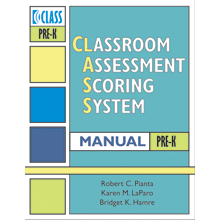We have all had that moment in the classroom when three-year-old Connor asks us for help. “It won’t fit!” he exclaims as he tries to put the square puzzle piece in the round spot. We have two options on how to respond:
Topics: Trainer Tips Read MoreFacilitating vs. Coaching in an MMCI Session
CLASS Is Like a House
I recently heard about a great analogy about the CLASS tool and I had to share it. I can’t take credit for the idea. Affiliate Trainer, Teresa Bockes, originated the concept, and I loved it the minute I heard it: CLASS is like a house. Let’s build a house step-by-step to learn more about this metaphor.
Topics: Pre-K, Trainer Tips Read MoreCLASS is More than Open-Ended Questions
Do you find that when you train teachers or coaches on CLASS, all they want to talk about is open-ended questions? When trainees hear CLASS tool, often the first thought that comes to their mind is asking children open-ended questions. And while asking “how” and “why” questions is extremely important in helping to foster and support language and concept development, we cannot have effective interactions with these questions alone. There is so much more to the CLASS tool!
Topics: Pre-K, K-12, Infant and Toddler Read MoreA Glimpse Into Video Diversity at Teachstone
As the Content Asset Manager at Teachstone, I spent most of my time managing our classroom videos. So when I talk to CLASS users in the field, I am frequently asked about the amount of racial, ethnic, and regional diversity in our video collections. When I respond, I usually begin by explaining that creating products that reflect the diversity of classrooms and communities across the country is a core value for Teachstone.
Topics: Fiabilidad y Certificación, Anuncios, Entrenamiento de Observación Read MoreWe often hear people asking about conducting CLASS observations during mealtimes. What kinds of interactions can be observed while children are just eating? Turns out—there are many examples of high-quality interactions during breakfast or lunch. Let's focus first on the Emotional Support CLASS domain.
Topics: Pre-K, K-12, Infant and Toddler Read MoreI have been a CLASS observer and trainer for several years now and I’ve been thinking about the concept of “drift.” Drift happens to people who have passed the reliability test, but over time they start scoring subjectively—they let their biases affect the data.
Topics: Trainer Tips Read MoreThe Scoring Summary Sheet can offer observers and coaches a lot of insight on what's happening in a classroom during a typical day. Located on page 18 of the Pre-K CLASS Manual, Figure 2.2 shows how to create a summary of all six observational cycles. It also allows coaches to ask data-backed, specific questions like, "What's happening during small group that may be affecting a teacher's behavior management interactions?"
Topics: Pre-K Read MoreHave you ever meditated? One of the most challenging aspects of this practice is clearing your mind from day-to-day thoughts that pop into your head. If you meditate, you know that trying to push those thoughts away doesn’t work— in order to free your mind you must first acknowledge those distracting thoughts before you can return to your “moment of zen.”
Topics: Fiabilidad y Certificación, Entrenamiento de Observación Read MoreWe recently received an email from an observer who had just completed his K-3 recertification and had some difficulty with Teacher Sensitivity. He stated that he was uncertain how to code the indicator of Addresses Problems if the students do not appear to have difficulties. He wondered if he needed to be more attentive to minor signs of awareness and responsiveness. If you've ever wondered that yourself or have had a trainee ask you that question, read on to see our response.
Topics: Pre-K, K-12 Read MoreFollowing the children’s lead and balancing time within the classroom schedule between child-directed and teacher-directed activities are not uncommon to those responsible for children’s learning in early education classrooms. Intentional teachers are aware of their responsibility to assess student progress, understand skill mastery and plan accordingly to provide opportunities for children to expand their understanding of ideas and concepts important to early childhood development. However, many times as teachers prepare to begin a specific teacher-directed activity, it is unsettling when students begin to veer from the step-by-step plans the teacher has worked hard to implement.










